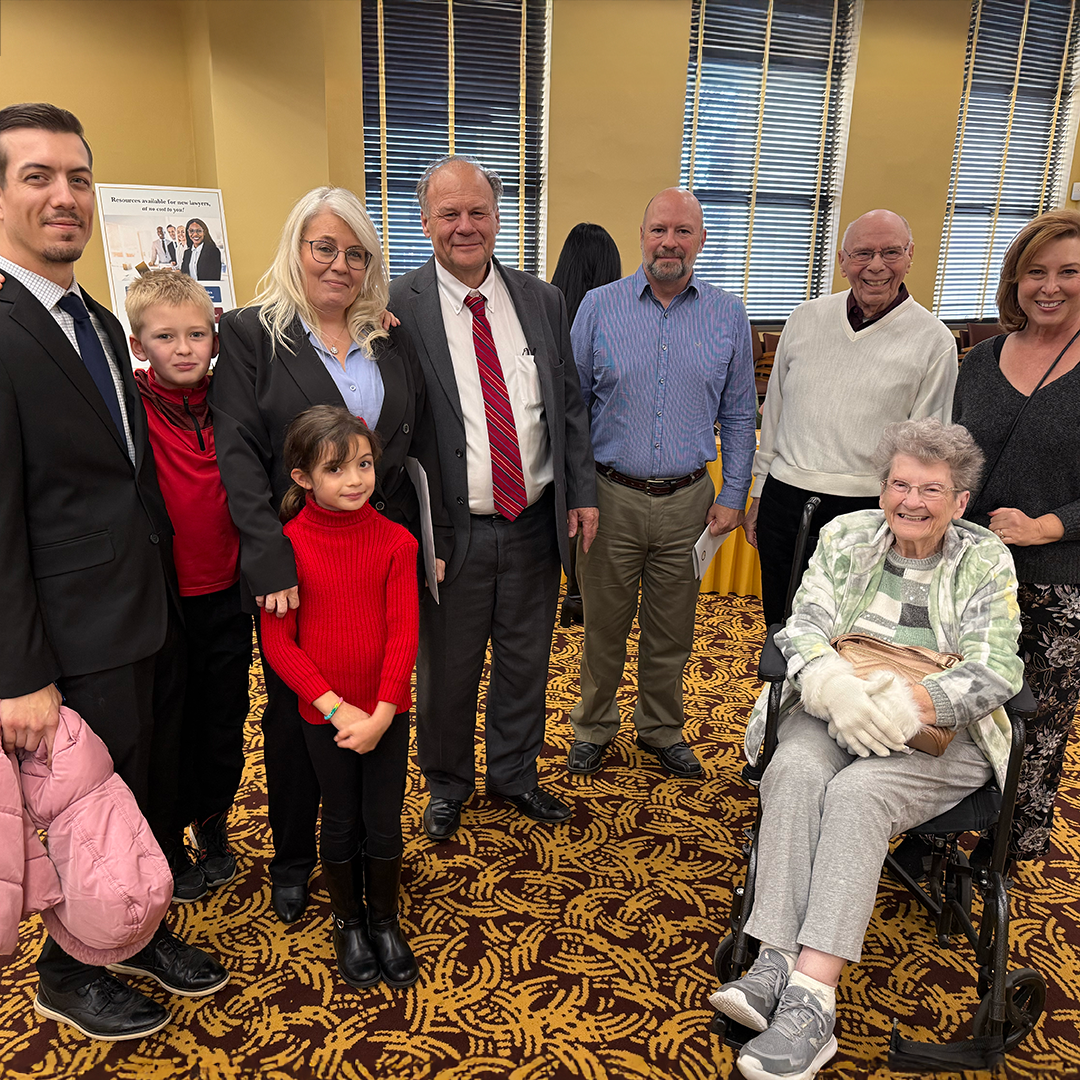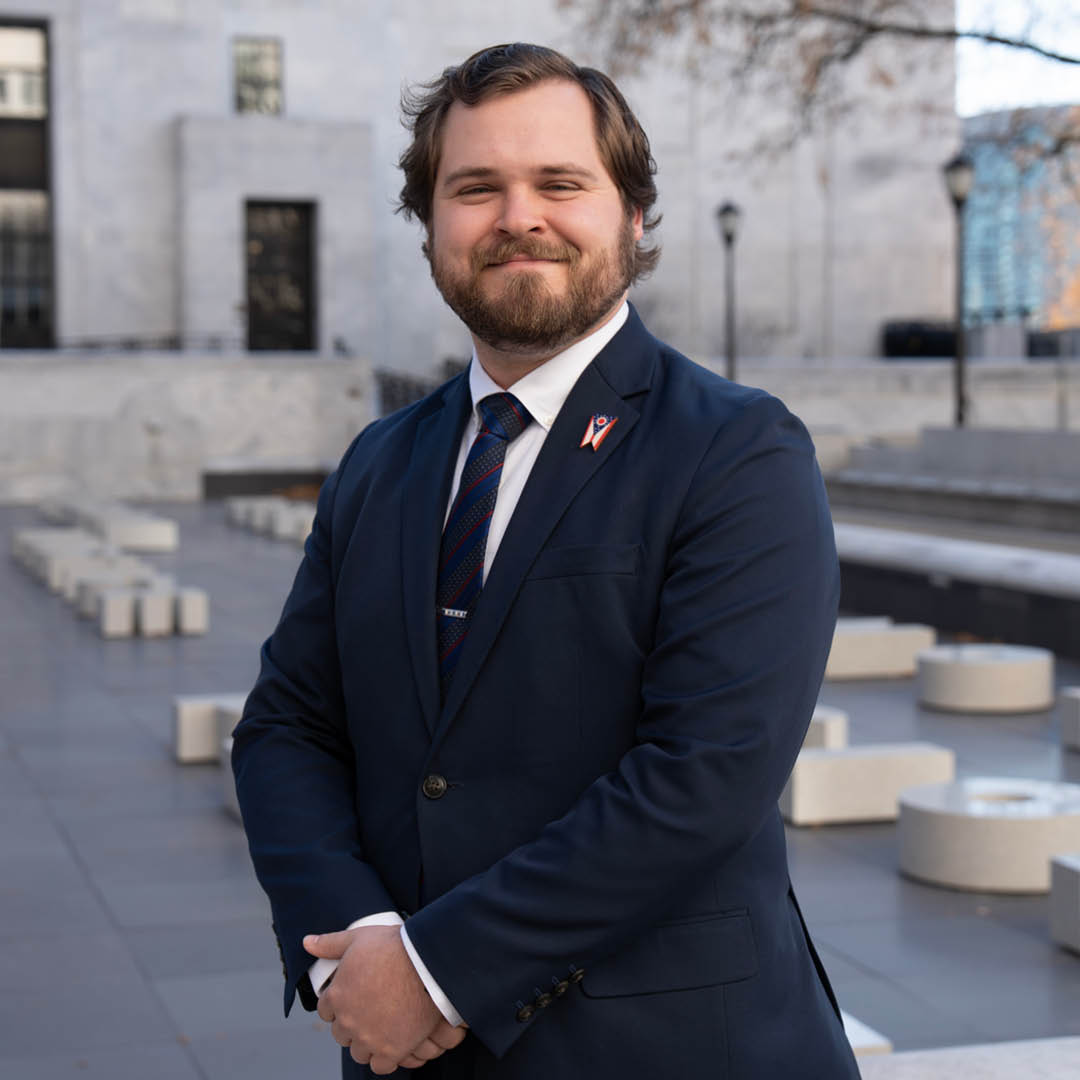More Than 600 New Lawyers Ready to Serve Communities

Family members joined Vicki Heiser to celebrate her swearing in. She will operate a general practice with her new law license.
Ohio welcomed 615 new attorneys to the practice of law during the November Bar Admission Ceremony and recognized them for their achievements.
“This has been the culmination of 20 years or more of formal education, and your education will continue every day of your professional life,” said Supreme Court of Ohio Chief Justice Sharon L. Kennedy. “But today, it is a moment to celebrate this milestone, the sacrifices, and the accomplishments for you, your family, and all who have supported you along your journey to this point.”
Vicki Heiser of Marion marked the occasion with her husband, son, grandchildren, and extended family.
Before law school, Heiser spent 13 years working as a paralegal for her husband, Larry. But when he was elected judge on the Marion County Family Court, she had to leave that role.
“I decided to go to law school and do it myself,” she said.
She drove an hour each way, every day to Ohio Northern University Pettit School of Law, all while maintaining her paralegal career and raising her grandson, Gabriel.
“I think she’s incredible,” said Judge Heiser of his wife. “She’s worked really hard, and she’s going to be a great attorney.”
Eager to begin her own general practice, Vicki Heiser had meetings with potential clients scheduled for the day after she was sworn in.
“Just do it,” said Heiser to anyone considering law school. “If it’s what you want to do, do it. Don’t let fear stop you.”

Cameron Wene is using the skills he learned during his externship at the Supreme Court of Ohio to analyze arguments in his new role as an assistant prosecutor.
Overcoming the Challenges of Law School
For Cameron Wene, becoming an attorney has been eight years in the making. A recent graduate of Capital University Law School, Wene knew in high school that he wanted to use his skills to serve his community through a career in public service. He also wanted to understand the law and how to use it, so becoming an attorney was the logical choice.
“Law school is one of the most difficult things, if not the most difficult thing, that I think people can go through, education-wise,” said Wene.
Through Capital University’s 3 + 3 Bachelor-to-Law program, Wene began law school while still completing his undergraduate degree. It meant taking the LSAT a year early, sacrificing the typical senior-year college experience, and becoming one of the youngest students in his cohort.
“Not having that extra year meant I had to work harder. I had to do better. I had to prove to myself that I was in the right space,” he said. “I'm not one to say that I needed to prove to others that I could do it. I just needed to reassure myself that I was doing what I thought I was called to do.”
In addition to classes, Wene also took on several internships and externships, including one at the Supreme Court of Ohio with Justice F. Patrick DeWine. Through that experience, he learned to review cases and petitions, ensure the accuracy of citations, and write memos on whether cases are appropriate to accept on appeal. Wene also researched the nuances between the Ohio Constitution and the U.S. Constitution.
While buried in countless hours of reading assignments, research, and paper writing, Wene watched as his friends moved on with careers and marriages. He said it was definitely difficult at times.
It was a sigh of relief the day the bar exam results were released, and he saw his name on the list.
“It was a rush of so many different emotions of gratification and a release of anxiety and relief,” Wene said. “I always think of the comments that are made at weddings, like, ‘Oh, it's the next chapter of their life.’ That's kind of what it feels like.”
The Beginning of a Lifelong Commitment
While the day was a celebration, it also marked the beginning of a career that requires more hard work, diligence, preparation, and attention to detail to succeed. Justice DeWine reminded the newly sworn attorneys that the oaths they took weren’t just a formality, but a lifelong commitment to the principles embodied in the Ohio and the U.S. constitutions.
“People turn to lawyers when they're at their most vulnerable. It may be a business struggling to get off the ground, a kid who doesn't want one mistake to ruin his or her life, a family dealing with divorce, or maybe someone who just needs their voice heard,” said Justice DeWine. “They look to us for dispassionate advice, for a clear understanding of the rules, and for scrupulous attention to detail. Take that responsibility seriously.”
Wene is learning this message firsthand as he begins his role as a juvenile prosecutor in Delaware County.
“In law school, one of the things they tell us is that lawyers are called counselors, because no matter what kind of law you do, you're interacting with someone on, usually, one of the worst days of their lives,” said Wene. “Seeing some of the things that kids go through puts it in perspective that bad things don't just happen to adults. I’m in a role where I not only get to advocate on behalf of victims in the community, but I also help try and get kids the resources they need.”
He is also learning to put the skills from his externship to use at his new job.
“The Supreme Court externship really helped me see the different ways to organize arguments. Now that I am in front of judges and magistrates, it’s really helped me see how I can formulate my argument to make the best legal sense, as well as to be persuasive,” said Wene.
He has also learned how to understand, evaluate, and anticipate what arguments the other side is formulating.
Justice DeWine noted at the ceremony that the skills to argue civilly are essential in the legal profession but also extend beyond the practice of law.
“Your legal training is a rare gift: The ability to disagree without being disagreeable, in a world that prizes sound bites of polarization. Lawyers are trained to build bridges between opposing views,” said Justice DeWine. “Be the architects of civil discourse. Use your legal skills to foster a true marketplace of ideas, not just in your practice, but in your community, to promote respectful and open debates.”
